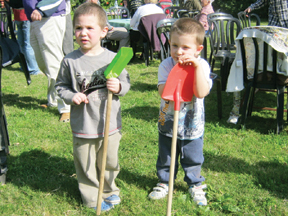 Tu b’Shevat, the New Year for the trees observed on the 15th day of the Hebrew month of Shevat, is being celebrated this week in Israel and all over the Jewish world. Here in Kansas City, we celebrated the holiday with many different events.
Tu b’Shevat, the New Year for the trees observed on the 15th day of the Hebrew month of Shevat, is being celebrated this week in Israel and all over the Jewish world. Here in Kansas City, we celebrated the holiday with many different events.
I remember celebrating Tu b’Shevat as a child on the kibbutz. For Israelis Tu b’Shevat is an important holiday as our connection to Israel is through the earth. We planted trees in our boots and coats and ate hot soup and fruits. Growing up on a kibbutz allowed me to see those trees grow and experience that natural process first hand. My dad tells me that all the trees on the kibbutz were planted on Tu b’Shevat by kids since the day they settled on the hill in the western Galilee. I’m very fortunate for having that unique experience of watching the tree I planted grow, blossom and bloom. And I’m even more fortunate for being able to do that in Israel and enjoy the fruits of the land, the seven species (“A land of wheat, and barley, and vines; of fig trees and pomegranates; a land of olive oil and honey.”).
Tu b’Shevat is one of what we call the “mitzvahs of the land” (the commandments of the land of Israel) that are only possible when one lives in Israel. Although the tradition of planting trees on that day is actually a late custom going back to the Zionist movement in the beginning of the last century in Israel, there are some laws that go back to biblical times. The Shmita, (Sabbatical year) that falls every seven years according to Jewish law, is another one of those Jewish laws regarding the land of Israel. The Shmita involves all farmers leaving their fields and allowing the ground to rest, letting the poor or any person take what they want and the cancellation of debts.
Although these two commandments are connected to the land of Israel, they should be lessons for the way we live our lives today. Tu b’Shevat is a time for us to celebrate nature and appreciate the great things we receive from it. Today, Tu b’Shevat is also an opportunity to change the way we look at the world around us and treat it better. The Shmita year is a time to put our work aside (in those days agriculture was the main trade for most people) and concentrate on our family and our community. Today, we can’t really leave our jobs every seven years but we can take that opportunity to invest more in ourselves and the people around us.
Like many laws, holy days, customs and ceremonies in Jewish tradition, Tu b’Shevat can have a profound meaning for our lives beyond eating fruits grown in Israel. I hope many of you enjoyed feasting on the seven species (and drinking some delicious Israeli wines), but I also hope that you took the time to recognize the beauty of nature and the privilege of being able to celebrate a holiday connected to the Land of Israel and the modern State of Israel.
Yahav Barnea is the Israeli Emissary of the Jewish Federation of Greater Kansas City.